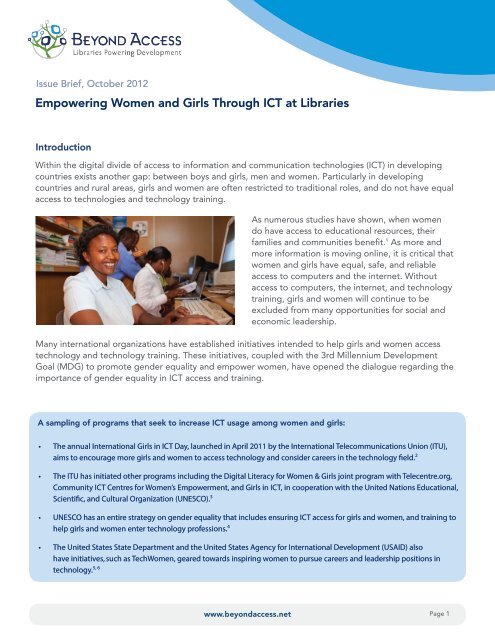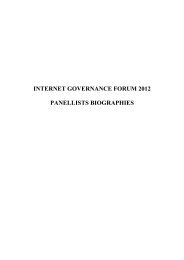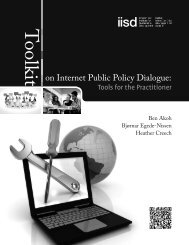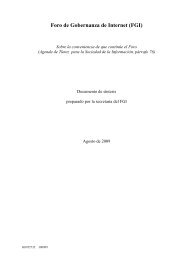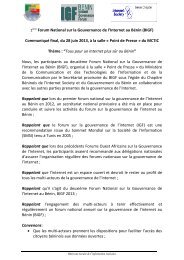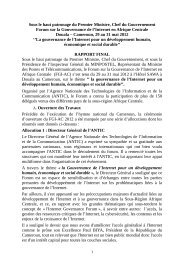Empowering Women and Girls Through ICT at Libraries - Internet ...
Empowering Women and Girls Through ICT at Libraries - Internet ...
Empowering Women and Girls Through ICT at Libraries - Internet ...
You also want an ePaper? Increase the reach of your titles
YUMPU automatically turns print PDFs into web optimized ePapers that Google loves.
Issue Brief, October 2012<br />
<strong>Empowering</strong> <strong>Women</strong> <strong>and</strong> <strong>Girls</strong> <strong>Through</strong> <strong>ICT</strong> <strong>at</strong> <strong>Libraries</strong><br />
Introduction<br />
Within the digital divide of access to inform<strong>at</strong>ion <strong>and</strong> communic<strong>at</strong>ion technologies (<strong>ICT</strong>) in developing<br />
countries exists another gap: between boys <strong>and</strong> girls, men <strong>and</strong> women. Particularly in developing<br />
countries <strong>and</strong> rural areas, girls <strong>and</strong> women are often restricted to traditional roles, <strong>and</strong> do not have equal<br />
access to technologies <strong>and</strong> technology training.<br />
As numerous studies have shown, when women<br />
do have access to educ<strong>at</strong>ional resources, their<br />
families <strong>and</strong> communities benefit. 1 As more <strong>and</strong><br />
more inform<strong>at</strong>ion is moving online, it is critical th<strong>at</strong><br />
women <strong>and</strong> girls have equal, safe, <strong>and</strong> reliable<br />
access to computers <strong>and</strong> the internet. Without<br />
access to computers, the internet, <strong>and</strong> technology<br />
training, girls <strong>and</strong> women will continue to be<br />
excluded from many opportunities for social <strong>and</strong><br />
economic leadership.<br />
Many intern<strong>at</strong>ional organiz<strong>at</strong>ions have established initi<strong>at</strong>ives intended to help girls <strong>and</strong> women access<br />
technology <strong>and</strong> technology training. These initi<strong>at</strong>ives, coupled with the 3rd Millennium Development<br />
Goal (MDG) to promote gender equality <strong>and</strong> empower women, have opened the dialogue regarding the<br />
importance of gender equality in <strong>ICT</strong> access <strong>and</strong> training.<br />
A sampling of programs th<strong>at</strong> seek to increase <strong>ICT</strong> usage among women <strong>and</strong> girls:<br />
• The annual Intern<strong>at</strong>ional <strong>Girls</strong> in <strong>ICT</strong> Day, launched in April 2011 by the Intern<strong>at</strong>ional Telecommunic<strong>at</strong>ions Union (ITU),<br />
aims to encourage more girls <strong>and</strong> women to access technology <strong>and</strong> consider careers in the technology field. 2<br />
• The ITU has initi<strong>at</strong>ed other programs including the Digital Literacy for <strong>Women</strong> & <strong>Girls</strong> joint program with Telecentre.org,<br />
Community <strong>ICT</strong> Centres for <strong>Women</strong>’s Empowerment, <strong>and</strong> <strong>Girls</strong> in <strong>ICT</strong>, in cooper<strong>at</strong>ion with the United N<strong>at</strong>ions Educ<strong>at</strong>ional,<br />
Scientific, <strong>and</strong> Cultural Organiz<strong>at</strong>ion (UNESCO). 3<br />
• UNESCO has an entire str<strong>at</strong>egy on gender equality th<strong>at</strong> includes ensuring <strong>ICT</strong> access for girls <strong>and</strong> women, <strong>and</strong> training to<br />
help girls <strong>and</strong> women enter technology professions. 4<br />
• The United St<strong>at</strong>es St<strong>at</strong>e Department <strong>and</strong> the United St<strong>at</strong>es Agency for Intern<strong>at</strong>ional Development (USAID) also<br />
have initi<strong>at</strong>ives, such as Tech<strong>Women</strong>, geared towards inspiring women to pursue careers <strong>and</strong> leadership positions in<br />
technology. 5, 6<br />
www.beyondaccess.net<br />
Page 1
Public <strong>Libraries</strong> as a Solution to the Gender<br />
Divide<br />
These programs are critical pieces of the campaign<br />
to foster girls’ <strong>ICT</strong> skills, but they often overlook<br />
<strong>and</strong> underuse a potentially valuable asset th<strong>at</strong><br />
could help scale <strong>and</strong> institutionalize girls’ access:<br />
public libraries. Public libraries are trusted, safe<br />
institutions th<strong>at</strong> already exist in many developing<br />
countries where large inequities in educ<strong>at</strong>ion <strong>and</strong><br />
opportunities for girls <strong>and</strong> women abound. The<br />
Global Impact Study, a recent research project on<br />
the impact of public access computing venues in<br />
developing countries, indic<strong>at</strong>es th<strong>at</strong> public libraries<br />
in developing countries serve more females than<br />
telecenters <strong>and</strong> cybercafés do. 7 Other research<br />
suggests th<strong>at</strong> girls <strong>and</strong> women choose public<br />
libraries over other public access venues because<br />
libraries are perceived as safe, reliable, <strong>and</strong><br />
affordable, often with trained female staff th<strong>at</strong> can<br />
help in places where it is not always appropri<strong>at</strong>e<br />
for females to interact with males. 8 As trusted<br />
community figures, librarians are well-positioned<br />
to support women through the process of applying<br />
<strong>ICT</strong> <strong>and</strong> other inform<strong>at</strong>ion tools.<br />
Some development initi<strong>at</strong>ives, particularly in<br />
<strong>ICT</strong>, cre<strong>at</strong>e st<strong>and</strong>-alone programs or seek new<br />
technologies to overcome technology disparities<br />
<strong>and</strong> include underserved popul<strong>at</strong>ions, like girls<br />
<strong>and</strong> women. As much of the liter<strong>at</strong>ure in the <strong>ICT</strong>4D<br />
field suggests, these programs <strong>and</strong> technologies<br />
often fail <strong>and</strong> are not sustainable. 9 Public libraries,<br />
however, are typically part of a larger network <strong>and</strong><br />
already included in local, regional, <strong>and</strong> n<strong>at</strong>ional<br />
government budgets.<br />
Some view mobile phones <strong>and</strong> mobile internet as<br />
the key to bridging the digital divide. However,<br />
mobiles alone are not enough, particularly when<br />
trying to reduce the social barriers girls <strong>and</strong><br />
women face with <strong>ICT</strong> access <strong>and</strong> training. Just as<br />
girls <strong>and</strong> women suffer from inequity of access<br />
to computers, internet, <strong>and</strong> technology training,<br />
females are far less likely than males to own or<br />
have access to a mobile phone, let alone mobile<br />
internet, in developing countries.<br />
<strong>Girls</strong> <strong>and</strong> women need places where they<br />
feel comfortable going to access computers,<br />
the internet, <strong>and</strong> technology training. Library<br />
stakeholders have emerged as strong advoc<strong>at</strong>es<br />
for comprehensive library <strong>and</strong> inform<strong>at</strong>ion services<br />
for women, 10 <strong>and</strong> public library systems around<br />
the world have already demonstr<strong>at</strong>ed their<br />
commitment to bridging gender gaps in <strong>ICT</strong> usage<br />
through targeted programs:<br />
The Northern Regional Library in Tamale, Ghana<br />
established a program th<strong>at</strong> provides technology<br />
training on internet, web 2.0 use, <strong>and</strong> search<br />
techniques, along with leadership development.<br />
The 3-month program trained 125 young women.<br />
The library instituted training hours to make it<br />
easier for girls to <strong>at</strong>tend the training while still<br />
working during the day. In addition to this training<br />
program, the Northern Regional Library also<br />
provides general computer <strong>and</strong> internet access<br />
for the community <strong>and</strong> hosts regular events about<br />
technology, cre<strong>at</strong>ing a space where female p<strong>at</strong>rons<br />
can particip<strong>at</strong>e.<br />
A library in Bogota, Colombia offers young girls<br />
aged 5-18 access to not only books <strong>and</strong> literacy<br />
programs, but also to computers, the internet, <strong>and</strong><br />
technology training. The technology resources<br />
available to these girls helps them excel in their<br />
schooling, communic<strong>at</strong>e with friends <strong>and</strong> family,<br />
<strong>and</strong> develop digital skills th<strong>at</strong> will help them<br />
through the rest of their lives.<br />
Librarians in the southern Ukraine city of<br />
Zaporizhia saw an opportunity to help their<br />
community when they noticed th<strong>at</strong> many girls were<br />
falling prey to drug abuse <strong>and</strong> other unhealthy<br />
choices. They launched a program to provide<br />
girls with <strong>ICT</strong> training, career advice, <strong>and</strong> an<br />
overall support network. The program offers basic<br />
computer training, as well as more specialized<br />
technology training in professions of interest to the<br />
girls. As a result of this program, girls are spending<br />
more <strong>and</strong> more time <strong>at</strong> the library using computers<br />
<strong>and</strong> the internet, focusing on their schoolwork, <strong>and</strong><br />
preparing for their futures instead of getting into<br />
trouble on the streets.<br />
www.beyondaccess.net<br />
Page 2
A library in Copán, Honduras offers technology<br />
training <strong>and</strong> digital literacy programs to the girls<br />
<strong>and</strong> women in their community. Many girls who<br />
have been trained <strong>at</strong> the library l<strong>at</strong>er became<br />
library volunteers themselves, training other<br />
people in the community—particularly girls <strong>and</strong><br />
women—in <strong>ICT</strong> <strong>and</strong> digital literacy. The training<br />
has improved school performance <strong>and</strong> enhanced<br />
the educ<strong>at</strong>ion of many, leading more girls to stay<br />
in school <strong>and</strong> actively seek out more educ<strong>at</strong>ional<br />
opportunities.<br />
The N<strong>at</strong>ional Library of Ug<strong>and</strong>a has introduced an<br />
<strong>ICT</strong> training program designed for female farmers.<br />
After conducting background research in local<br />
communities, the library found th<strong>at</strong> female farmers<br />
have many unmet inform<strong>at</strong>ion needs, <strong>and</strong> would<br />
benefit from access to we<strong>at</strong>her forecasts, crop<br />
prices, <strong>and</strong> planting inform<strong>at</strong>ion, particularly in<br />
local languages. This program empowers women<br />
farmers <strong>and</strong> increases their economic well-being<br />
through technology skills, even helping them set<br />
up online markets for their crops. In addition to<br />
in-person training, the program also provides<br />
agriculture inform<strong>at</strong>ion to particip<strong>at</strong>ing women<br />
through mobile phones <strong>and</strong> text messages.<br />
Recommend<strong>at</strong>ions<br />
Public libraries in many countries are providing<br />
girls <strong>and</strong> women the opportunity to access<br />
computers <strong>and</strong> the internet <strong>and</strong> gain valuable<br />
digital skills th<strong>at</strong> help them improve their lives.<br />
<strong>Girls</strong> <strong>and</strong> women should be equally included <strong>and</strong><br />
encouraged to particip<strong>at</strong>e in the inform<strong>at</strong>ion<br />
society in order to propel their own development,<br />
as well as the development of their families <strong>and</strong><br />
communities. For those institutions, organiz<strong>at</strong>ions,<br />
<strong>and</strong> governments who have gender <strong>ICT</strong> inclusion<br />
goals <strong>and</strong> objectives, we suggest the following:<br />
1. Development agencies should consider<br />
partnering with public libraries for all gender<br />
<strong>and</strong> <strong>ICT</strong> initi<strong>at</strong>ives, particularly access <strong>and</strong><br />
training programs. Many public libraries in<br />
developing countries are already offering<br />
computer <strong>and</strong> internet access <strong>and</strong> training.<br />
Many libraries already have the infrastructure<br />
<strong>and</strong> community particip<strong>at</strong>ion needed for <strong>ICT</strong><br />
access <strong>and</strong> training programs to work.<br />
2. Development agencies, policy makers, <strong>and</strong><br />
governments should support <strong>and</strong> build upon<br />
infrastructure already in place in libraries<br />
r<strong>at</strong>her than designing new programs from<br />
scr<strong>at</strong>ch. Public libraries already exist in many<br />
communities as a safe, trusted place for<br />
girls <strong>and</strong> women to access <strong>ICT</strong> <strong>and</strong> receive<br />
technology training. R<strong>at</strong>her than building<br />
new institutional structures, development<br />
stakeholders should consider leveraging <strong>ICT</strong><br />
access <strong>and</strong> training programs in public libraries<br />
to meet gender access objectives.<br />
3. Governments <strong>at</strong> all levels should ensure<br />
public libraries are equipped with quality<br />
technology, internet connections, <strong>and</strong><br />
trained staff to help girls <strong>and</strong> women gain<br />
the benefits associ<strong>at</strong>ed with <strong>ICT</strong> usage.<br />
Where public libraries lack <strong>ICT</strong> resources,<br />
development priorities should include ensuring<br />
public inform<strong>at</strong>ion access exists where it can<br />
best be supported permanently. Governments<br />
should support technology, internet, <strong>and</strong><br />
training in public libraries.<br />
For more examples of how public libraries around<br />
the world are introducing girls <strong>and</strong> women to<br />
technology <strong>and</strong> <strong>ICT</strong> skills, please visit www.<br />
beyondaccess.net.<br />
www.beyondaccess.net Page 3
References<br />
1. Herz, B., & Sperling, G. (2004). Wh<strong>at</strong> works in girls’ educ<strong>at</strong>ion: evidence <strong>and</strong> policies from the developing world. New York:<br />
Council on Foreign Rel<strong>at</strong>ions. <br />
2. Intern<strong>at</strong>ional Telecommunic<strong>at</strong>ions Union (ITU). (2011). “Intern<strong>at</strong>ional ‘<strong>Girls</strong> in <strong>ICT</strong> Day’ launched.” <br />
3. Intern<strong>at</strong>ional Telecommunic<strong>at</strong>ions Union (ITU). (n.d.). “<strong>Women</strong> <strong>and</strong> <strong>Girls</strong> website.” Retrieved from ITU Website: Special Initi<strong>at</strong>ives:<br />
Gender. <br />
4. United N<strong>at</strong>ions Educ<strong>at</strong>ional, Scientific, <strong>and</strong> Cultural Organiz<strong>at</strong>ion (UNESCO). Priority Gender Equality Action Plan 2008-2013.<br />
<br />
5. United St<strong>at</strong>es Agency for Intern<strong>at</strong>ional Development (USAID). (n.d.). “Gender <strong>and</strong> Inform<strong>at</strong>ion & Communic<strong>at</strong>ions Technology.”<br />
Retrieved from USAID website: Gender Equality <strong>and</strong> <strong>Women</strong>’s Empowerment. <br />
6. United St<strong>at</strong>es Department of St<strong>at</strong>e: Bureau of Educ<strong>at</strong>ional <strong>and</strong> Cultural Affairs. (n.d.). “Tech<strong>Women</strong>.” <br />
7. Technology & Social Change Group (TASCHA). (n.d.). “Global Impact Study.” <br />
8. Terry, A., & Gomez, R. (2011). Gender <strong>and</strong> Public Access Computing: an intern<strong>at</strong>ional perspective. Proceedings of HICSS-44,<br />
Hawaii, Jan 2011.<br />
9. Sey, A., & Fellows, M. (2009). Liter<strong>at</strong>ure review on the impact of public access to inform<strong>at</strong>ion <strong>and</strong> communic<strong>at</strong>ion<br />
technologies. Se<strong>at</strong>tle: Technology & Social Change Group (TASCHA). <br />
10. Intern<strong>at</strong>ional Feder<strong>at</strong>ion of Library Associ<strong>at</strong>ions (IFLA). (n.d.). “About the <strong>Women</strong>, Inform<strong>at</strong>ion <strong>and</strong> <strong>Libraries</strong> Special Interest<br />
Group.” Retrieved from IFLA website: <br />
About Beyond Access:<br />
Beyond Access is an initi<strong>at</strong>ive of IREX, EIFL, IFLA, Makaia, Civic Regener<strong>at</strong>ion, TASCHA, The Riecken Found<strong>at</strong>ion, <strong>and</strong> READ Global, with support<br />
from the Bill & Melinda G<strong>at</strong>es Found<strong>at</strong>ion.<br />
www.beyondaccess.net Page 4


